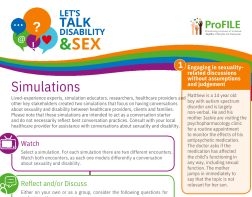Welcome to our simulations page!
On this page you will find video simulations that focus on having conversations about sexuality and disability. In these videos, conversations happen between healthcare providers, clients, and families.
About the Simulations
The simulations were created by:
- Young adults with disabilities
- Parents of children with disabilities
- Simulation educators
- Researchers
- Healthcare providers
These simulations:
- Were created to help you start the conversation about sexuality
- Do not necessarily show best ways to have a conversation, but aim to prompt reflection and discussion.
Watch and Reflect
Select a simulation to watch. You will find two different encounters for each simulation. Please watch both encounters. Each one shows a different way to have a conversation about sexuality and disability.
As you watch the simulations, consider the following questions:
- How do you think each of the individuals felt in the situation? Why do you think they felt like that?
- What did the healthcare provider do or say that was helpful? Why?
- What could the healthcare provider have done or said that could have been even more effective?
- What family or client strengths did/could the healthcare provider capitalize on?
- What are the main messages you will take away from this scenario?
Engaging in non-judgmental conversations about sexuality with young people with disabilities
Grace is a 18 year old girl who has cerebral palsy and just recently had hip surgery. She is meeting with Julie, a social worker, to discuss discharge planning. As part of their conversation, sexuality is brought up hesitantly by Grace. She talks about her relationship with her boyfriend and is unsure about how her injury will affect her sexually.
Highlighting the importance of sexuality in young people with disabilities
Matthew is a 14 year old boy with autism spectrum disorder and is largely non-verbal. He and his mother Jackie are visiting the psychopharmacology clinic for a routine appointment to monitor the effects of his antipsychotic medication. The doctor asks if the medication has affected the child’s functioning in any way, including sexual function. The mother jumps in immediately to say that the topic is not relevant for her son.
